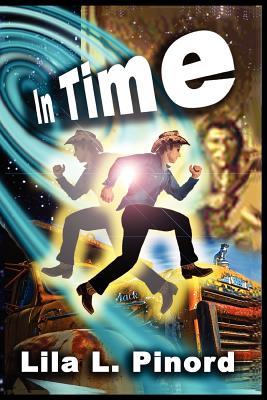Title: In Time
Author: Lila L. Pinord
Publisher: Xlibris
ISBN: 9781462895397
Pages: 236, Paperback/Kindle
Genre: Fantasy
Reviewed by: Brandon Nolta, Pacific Book Review
Book Review
Traveling can be a tiring activity, whether you’re driving across the state or flying halfway around the world. As Lila L. Pinord demonstrates in her novel In Time, flitting across space and time at random is even more exhausting, and a good deal more frightening.The book follows a number of characters, but is most concerned with a young man named Cowboy, who is separated from his parents by an unusual phenomenon in space-time and ends up wandering the world, finding friends and family at every turn, but always searching for that true connection – his mother – that seems to just elude him. All the while, his mother, Ellie, continues to search for her son, while people in her town shift into unrecognizable beings and the lure of unearthly portals to elsewhere beckon. Just as her son does, Ellie finds new friends and family, even as she continues to scour the universe for her boy.
As befitting a story that leaps throughout history and the Pacific Northwest, Pinord’s book is fast-paced, almost relentless in its drive throughout the narrative’s unwinding. Historical events and personages come and go – Frank Lloyd Wright, Blackbeard and Meriwether Lewis, among others, make appearances in the story – and readers expecting a little more measure in their reading may be left exhausted by the whirlwind. Unfortunately, the unflagging pace pushes the language and the character development faster than it’s ready to go; the book feels rushed from beginning to end, and because of the emphasis on plot, most of the characters seem to talk in the same voice, making it difficult to distinguish individuals in the blur. Because many of the characters come from different points in history, this similarity in voice also gives the narrative an anachronistic feel at times.
To make things more challenging, the number and similarity of the characters fragments the plot, making the novel read like a series of loosely connecting vignettes rather than a unified narrative. Despite Cowboy seeming to be the central character, he disappears for much of the story, and his connection to the phenomena is never adequately explained or connected to a larger element. So many questions are raised and discarded in the course of the story that the book’s focus becomes muddled, a condition that isn’t helped by the novel’s rapid changes in point of view, which sometimes occur mid-sentence. This further drags the narrative momentum down, an unfortunate turn especially in how it detracts from Pinord’s sure grasp of physical and geographic description, which grounds some of the book’s more fanciful elements.
Overall, there’s a lot in Pinord’s book to enjoy; she binds an intriguing plot in a large cast of characters and sends the bundle out into a richly drawn world to play and unravel. However, the rush of “everything goes” narrative, rapid shifts in viewpoint and too many indistinct voices drag the story down into a frustrating spiral, keeping the story from taking flight. Too many ingredients can spoil the stew, which is the case here.


